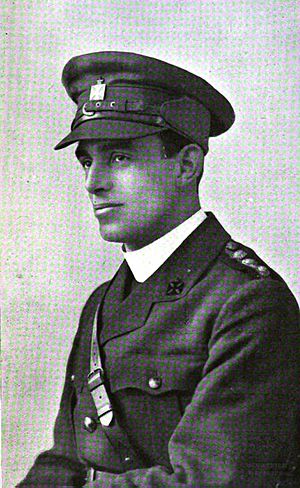Geoffrey Studdert Kennedy facts for kids
Geoffrey Anketell Studdert Kennedy (born 1883, died 1929) was an English Anglican priest and poet. During World War I, soldiers called him "Woodbine Willie." He earned this nickname because he gave Woodbine cigarettes to soldiers. He also helped injured and dying soldiers with comfort and spiritual support.
Contents
Early Life and Education
Geoffrey Studdert Kennedy was born in Leeds, England, on June 27, 1883. He was one of nine children. His father, William Studdert Kennedy, was a vicar (a type of priest) in Leeds. Geoffrey's family had Irish roots, and he always felt a strong connection to Ireland.
He went to Leeds Grammar School and then to Trinity College, Dublin. There, he studied classics and divinity. After college, he trained to become a priest. In 1914, he became the vicar of St. Paul's Church in Worcester.
"Woodbine Willie" in World War I
When World War I began, Studdert Kennedy volunteered to be a chaplain for the army. He served on the Western Front, which is where he got his famous nickname, "Woodbine Willie."
In 1917, he received the Military Cross for his bravery. This happened at Messines Ridge. He bravely ran into dangerous "no man's land" to help wounded soldiers during a battle.
He strongly supported the British war effort. He even toured with boxers and wrestlers. He gave speeches to boost the soldiers' spirits. One person described his talks as "the most extraordinary talk I ever heard." He wrote many poems about his war experiences. These poems were published in books like Rough Rhymes of a Padre (1918).
Life After the War
After the war, Studdert Kennedy became a priest at St Edmund, King and Martyr in Lombard Street, London. During the war, he had become a Christian socialist and a pacifist. This meant he believed in helping working people and promoting peace.
He wrote several books, sharing his ideas about society and faith. He believed that churches should help people in their daily lives, not just on Sundays. He famously said, "If finding God in our churches leads to us losing Him in our factories, then better we tear down those churches for God must hate the sight of them."
He traveled around Britain, giving speeches to support working-class people. On one of these tours, he became very ill with the flu. His lungs were already weak, and he sadly died in Liverpool on March 8, 1929, at the age of 45.
His funeral was held in Worcester. Many World War I veterans and working-class people came to show their respect. The Dean of Westminster did not allow him to be buried at Westminster Abbey. This was because he called Studdert Kennedy a "socialist." However, Studdert Kennedy never joined any political party.
Honours and Lasting Impact
Honours
Geoffrey Studdert Kennedy was awarded the Military Cross (MC) during World War I. The award recognized his great courage. It stated he showed "disregard for his own safety in attending to the wounded under heavy fire." He searched for wounded soldiers, both British and enemy. His cheerful attitude helped everyone in the trenches.
The Museum of Army Chaplaincy in Hampshire has a large display about his life. In 2013, a special plaque was put up in Ripon, North Yorkshire, to honor him and the Ripon Clergy College.
The Church of England remembers Studdert Kennedy on March 8. This is a special day on their calendar of saints.
Lasting Impact
Studdert Kennedy wrote a poem called Roses in December. J.M. Barrie, the author of Peter Pan, famously quoted this poem in a speech in 1922.
He is also mentioned in the song "Absent Friends" by the band Divine Comedy. The Irish author James Joyce also mentioned him in his book Finnegans Wake.
Archbishop Fulton J. Sheen often quoted Studdert Kennedy's poem "Indifference." Sheen used the poem to talk about the importance of caring and enthusiasm in life. He said that the world suffers from "apathy, not caring."
Geoffrey Studdert Kennedy's son, Michael Studdert-Kennedy, became a well-known psychologist and linguist.
Works
Geoffrey Studdert Kennedy wrote many poems and books.
- Poetry
- 1918: Rough Rhymes of a Padre
- 1919: More Rough Rhymes of a Padre
- 1920: Peace Rhymes of a Padre
- 1927: The Unutterable Beauty (a collection of his poems)
- Books
- 1918: Rough Talks by a Padre
- 1919: Lies
- 1921: Democracy and the Dog Collar
- 1921: Food for the Fed Up
- 1923: The Wicket Gate
- 1926: The Word and the Work
 | Jewel Prestage |
 | Ella Baker |
 | Fannie Lou Hamer |


